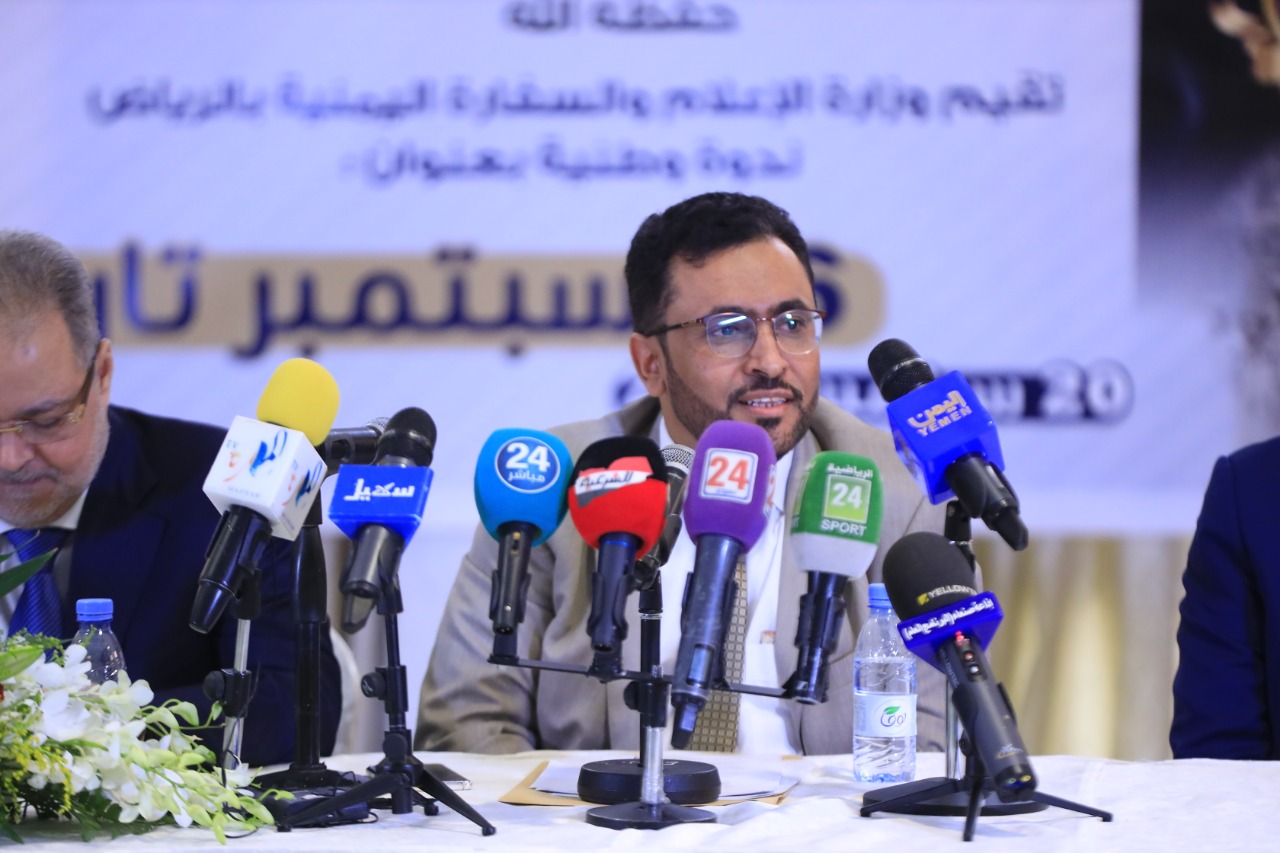فيس بوك
جوجل بلاس
تنفيذي الإصلاح بالمحويت ينعى القيادي الداعري أحد رواد التربية والعمل الاجتماعي
طلابية الإصلاح بحضرموت تنظم أمسية شبابية «لبناء جيل واعٍ ومدرك للقضايا الوطنية والعربية»
رئيس الهيئة العليا للإصلاح يتصل للاطمئنان على الشيخين الزنداني وصعتر
الرئيس العليمي يطمئن على الشيخ صعتر عقب نجاته من تفجير ارهابي غادر ويشيد بمواقفه المشرفة
رئيس الهيئة العليا للإصلاح يعزي سلطان عمان وأسر ضحايا السيول
حضرموت.. الإصلاح بسيئون ينظم العواد السنوي للشخصيات الاجتماعية والسياسية
الأمين العام المساعد للإصلاح يقدم واجب العزاء في استشهاد أبناء هنية
الإصلاح بحضرموت يدعو إلى تفعيل الأجهزة الرقابية والعمل النقابي والمهني
الجرادي: النظام الجمهوري بالنسبة لليمنيين انعتاقاً من نظام العبودية والكهنوت وإدعاء التمييز الإلهي
الإصلاح يدين بشدة استمرار جرائم الاحتلال الصهيوني في غزة ويعزي في استشهاد أبناء هنية

Deputy Head of the Information and Culture Department of the Yemeni Islah Party, Mr. Adnan al-Audayni, said, “Talking about September is a talk about the Yemeni self on the day that it regained its national spirit."
In the national symposium organized by the Ministry of Information at the Yemeni embassy in Riyadh on the occasion of the 58th national day of the September 26 revolution, al-Audayni added, "Before September, we were just subjects, but after September 26, we became citizens and a people that has sovereignty over themselves."
He continued, "This sovereignty was monopolized in the category of the Imamate so that from the intensity of this Imamate in its supremacy over the Yemeni people, it monopolized this characteristic in itself."
Al-Audayni mentioned that talking about the Houthi movement is an extension of the imamate does not need proof, stressing that the imamate is clear in the Houthi structure, whether in its ideological structure, its way of dealing, or its political behavior.
Al-Audayni said, "We cannot find any feats for this imamate movement, no university, no hospital, no bridge, not even a mosque. This movement left only a huge number of graves. All the states that appeared on the Yemeni map left feats behind, except for this movement, which arose as a strange and immigrant.
He added, "The imamate did not have a history or heritage inside Yemen, and therefore it had no choice but to demean this Yemeni self that is growing in front of the goals of this movement, which depends on two things, namely, excessive violence and transcendence on the Yemeni self."
He emphasized that the Imamate distorted the true religion and distorted the Yemeni heritage, where it did not establish a state for Yemenis and did not keep a religion for them, pointing out that the reader of the history of al-Hadi knows the interpretation of what is happening now in terms of looting and bombing of homes.
He continued, "The September 26 Revolution granted the people the historical document stating that ruling is a right for Yemenis and based on this document we came out in 2011 and we still demand that the ruling be the right of the Yemenis and that we do not allow attacks on it, whether in the name of the real or fake imamate."
He pointed out that Yemenis go to national dialogues without deciding on the overall pillars of the state, including the establishments of army and security, and that the army is the property of the state, not of parties, groups, and families.
Al-Audayni stated that political crises in their highest form will lead to early elections, but the fact that weapons remain outside the national institution is what pushes the scene towards wars.
He continued, "We went to the National Dialogue Conference despite the presence of weapons with the Houthis. The Houthis were participating in the dialogue while they possessed weapons, and in this case, the scene ends with all politics being subject to weapons. This matter is intended to be repeated now in the coming negotiations." Al-Audayni stressed that without deciding on this issue, the Yemeni people will go towards successive wars, noting the way in which a statement was issued in the year 90 by the Al-Haq Party when weapons were not present with the imamate, which confirmed that the imamate is not available now, meaning when The imamate is available, we will be with her, and it is available when she has weapons and her thought spreads.
Al-Audayni stressed the need to reassess the previous period, the period of the republic, wondering why the republic was not a real republic like the rest of the world.
He explained that this evaluation should focus on the Republic’s great goals, including determining in a decisive and rapid way the mechanism for entering and leaving power, noting that most of Yemen’s presidents were killed because the mechanism for reaching power was not settled.
Al-Audayni emphasized that if this problem is not resolved, access to power will remain dependent on the sound of bullets and not the electoral vote, and this matter makes the Yemenis pay a lot of blood, money, property, and history that is wasted.
Al-Audayni noted that all the transitions to power in the country were by the sound of bullets, which requires a comprehensive national review to determine the path of entry and exit to and from power.